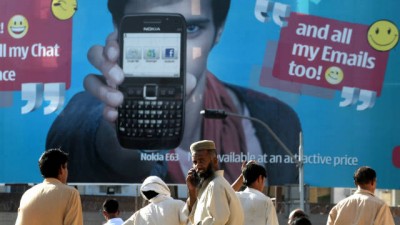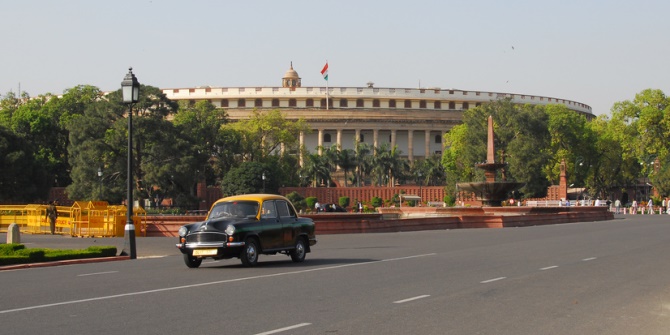LSE’s Emrys Schoemaker argues that the spread of mobile internet in Pakistan is likely to drive social change rather than economic growth.
Pakistan’s Supreme Court in September ordered the government to auction third generation (3G) mobile spectrum licenses. The order was met with excitement and claims that mobile internet would catalyse the economy and usher in a naya (new) Pakistan, claims based on statistics that correlate internet penetration to GDP. But these claims will not materialise because they fail to account for the reality of the way people actually use mobile internet. In Pakistan, although aspirations of a mobile internet-fuelled economic revolution are unlikely to be met, there may yet be a mobile internet revolution with more far-reaching implications than a potential contribution to GDP.
Interest in the 3G auction is driven by the fact that new communication technologies have already had a big impact in Pakistan. Pakistan’s 180 million people have nearly 120 million mobile phone subscriptions and more than 20 million internet connections. The country has the region’s highest mobile phone penetration, some of the lowest calling costs, and an established software and technology sector. New media technologies have already enabled political activism and development innovations such as government accountability initiatives, mobile money services, and tools to make market prices more accessible.
The specific claims for mobile internet’s contribution to economic growth rest on the assumption that it combines the benefit of fixed line internet access with the accessibility of mobile phones. Since rolling out mobile networks is cheaper than laying expensive copper wires, wireless internet promises to ‘leapfrog’ the obstacles to internet adoption. According to one study, a 10 per cent substitution from 2G to 3G penetration increases GDP per capita growth by 0.15 percentage points.
But there are several reasons to be sceptical of the economic claims for mobile internet. First, internet-enabled mobile phones do not have the same productive capacity as desktop or laptop computers. Very few people write, communicate, research, or carry out economically productive activities on a mobile phone in the same way they do on a computer. One study concludes that “as new users get online, fewer and fewer of them appear to be content producers”. Rather than productive content generation, internet use on a mobile is dominated by entertainment consumption and social networking.
The diversity of information consumed on mobile phones is also far less compared to fixed line internet use. Studies show that mobile users rely on the first few search returns, and only access 3.5 categories of websites compared to 8.6 for desktop users. It doesn’t help that only 10 per cent of websites are versioned for mobile use, and there is limited local content on mobile platforms. As a result, Facebook and Google dominate mobile usage in nearly every country.
For countries like Pakistan that seek to anticipate the impact of mobile internet, the implications of these findings are for trends in information consumption rather than content production. And the impact of information consumption – especially entertainment media – is more likely to be social than economic. Mobile internet use in Pakistan, if it follows the patterns of use in other countries, is likely to be dominated by entertainment—downloading and streaming music and videos. The majority of online entertainment content is global and largely western, reflecting the values of different countries and societies. What will it mean for relations between Pakistan’s growing youth demographic hungry for online content and state gatekeepers fearful of the erosion of deeply held social values?
Mobile and internet technologies have already been linked to the changing nature of relations between men and women in Pakistan. Anthropologists such as Hamza Alavi describe control over marriage as one of the building blocks of social status as well as economic and political relations. But digital technologies now threaten that control. The spread of fast mobile internet access means more young people will have even greater opportunity to connect with each other and in so doing challenge the expectations of their parents, families, and deeply held social norms. Concerns about the impact of mobile technologies on male-female relations are already so rampant that the Pakistan government directed mobile operators to stop offering free late-night calls and chat forums for fear they promote ‘immorality’.
The spread of mobile internet in Pakistan will also raise new questions about privacy and safety. Social media redefines the boundaries of private and public in ways that are yet to be understood, and often with damaging consequences. For example, in September, a man in Karachi was arrested for setting up fake Facebook accounts, ‘friending’ women, and blackmailing them by threatening to destroy their reputation—one of the most important social assets in Pakistani society. Religious minorities – already persecuted in Pakistan and increasingly dependent on privacy for their safety – could also be negatively affected by the erosion of privacy. And what are the implications of mobile internet for political debate? What would be the social consequences if people increasingly hesitate to express dissenting views online for fear of being exposed, identified, and targeted on Facebook?
Growing social media use would also likely impact the trend of migration from Pakistan’s rural areas to its cities. Research on social media use in Trinidad suggests that the maintenance of relationships through sites like Facebook has the potential to challenge the processes of social change associated with urbanisation, particularly the weakening of traditional family, friend, and community ties. As people move to cities, Facebook might curtail the discarding of social ties on which processes of modernisation are based. What would it mean for an increasingly urban Pakistan if rural home communities were better able to monitor urban migrants, whether students or those searching for work?
The process of auctioning Pakistan’s 3G spectrum has been slow, but the impact of the technology is likely to be felt far more quickly. Concerns about values and privacy and other public tensions will certainly make the new technology a social rather than economic phenomenon.
Emrys Schoemaker is a PhD candidate at LSE’s Department of International Development.








Nice post Emrys. Good to see someone challenge the wisdom of The Economist and their regular ‘Mobile Marvels’ type pieces asserting that cellphones are the solution to development growth? http://www.economist.com/node/14483896
Responding to your fear that people might become “increasingly hessitent to express disenting views online”, what might be done to encourage such critical voice and dissent?
It is good news for all Pakistanis and it will provide employment to millions people.
It is the fastest technology in Pakistan.